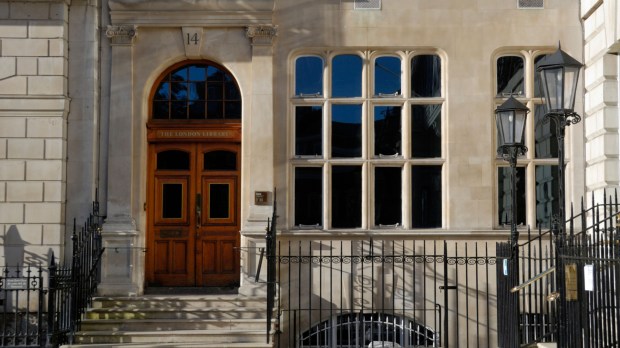David Cameron is surely right to think that Jean-Claude Juncker is not the man to relieve the European Union’s woes, but I wonder if it is worth a fight. It reminds me of a similar battle by John Major, in 1994, to prevent a fat Belgian called Jean-Luc Dehaene from getting the job, on the grounds that he was too federalist. The post then duly went to Jacques Santer — like M. Juncker, a Luxembourgeois with an alleged fondness for alcohol (he was known as ‘Sancerre’). M. Santer was no better, from the British point of view, than M. Dehaene, and some European diplomatic chips were pointlessly used up. Given Mr Cameron’s stated wish for a move away from integration, it is impossible to imagine a candidate for the presidency of the Commission who would fit his bill. Wouldn’t it be better to accept M. Juncker, who is generally regarded as stale and unimpressive, than to try to get someone able, like Christine Lagarde? Mrs Thatcher made a similar mistake when she endorsed Jacques Delors. Now, touted by Peter Mandelson, along comes the dangerously able Pascal Lamy, once Delors’ right-hand man.
There has been little attention to the exact reason why King Juan-Carlos of Spain has abdicated now. It is because constitutional reform was expected soon. The succession to the throne would probably be part of this reform. Attempts might then be made to change the law of succession to allow the eldest-born to succeed, regardless of sex. This could have provoked a crisis, since Prince Felipe, Crown Prince since infancy, has an older sister, Princess Elena. She has never pretended to the throne, but a politically correct change of law would have made her the heir, whether she wanted it or not. So, by abdicating now, Juan-Carlos has ensured an undisputed succession and made Felipe king. The Spanish story indicates the frivolity of Nick Clegg’s insistence on changing the British law of succession (still not accomplished, by the way, because it involves the assent of 16 other realms) to make it ‘gender-neutral’. Luckily for us, no disruption immediately arises, because the Prince of Wales and Duke of Cambridge would succeed under either system. But mucking around with succession laws is usually a very bad idea, and traditionally a cause of civil strife.
‘Big oil’, ‘big pharma’, ‘big tobacco’ are all derogatory shorthand for powerful industries unpopular on the BBC. One can see the utility of the expression but, in the interests of fair reporting, it should be permitted only if also applied to fields on the left — ‘big NHS, ‘big NGO’, and, thinking of the Corporation itself, ‘big media’.
Behind the famed ‘Plebgate’ row lies something strange, going beyond the specific case of Andrew Mitchell. It is the attitude of the police responsible for the gates of Downing Street, the Diplomatic Protection Group (DPG), to their job. The Sunday Times reports that, as long ago as June 2011, the head of security at No. 10 protested formally to the DPG about the obstruction of cabinet ministers (and the failure to recognise them) when they tried to go through the gates. Cabinet ministers were ‘entitled to unfettered access to Downing Street any time of day or night’, he wrote. It is extraordinary that such a basic and correct doctrine needed to be asserted to the police. I have heard people say, ‘Why couldn’t the cabinet ministers wait in turn and wheel their bikes like anybody else?’ This begs the question. There would be no need for the gates if terrorists did not want to blow prime ministers and cabinet ministers up (there were no such gates until after the Brighton bomb of 1984). The DPG seem to have got themselves into a frame of mind in which the gates belong to them, and those for whose protection they exist are regarded as a nuisance. This, in turn, suggests that security — the point of the whole thing — is something they have stopped caring about. If I were a terrorist, I would take note.
Although we are supposed to worry about the big problems of the world, most of us get more agitated by small things near to home. These things affect our votes: whether or not, say, our town or village gets a bypass, is often more of an election decider than any scheme to end global starvation (this helps explain the electoral toxicity of HS2). The trivial question which obsesses me at present is cold calling. Although I employed the BT service which is supposed to prevent such calls, I am plagued by them. Regardless of all other political views, I am so fed up that I would vote for the party that could stop these things. No doubt such a party does not exist, however. Which tends to show that human reasoning is not quite as selfish as I have made it sound: if no party can stop cold calls, why on earth should anyone imagine that it could stop world hunger?
A National Moth Atlas is in preparation for 2018. In Sussex, we are as moth-eaten — if that is the right phrase — as any region of the country, being near the sea and relatively warm. In the preliminary versions, our own little patch glows green on our county’s bit of the whole thing, declaring that we have more moths than any other area not actually on the coast. This is a classic example of how statistics are skewed by their collection. It simply results from the fact that my wife is the most assiduous moth-recorder known to man. The background to figures is almost never mentioned when statistics are published, yet it makes almost all the difference. You often hear, for example, that racial or sexual harassment has shot up, without it being explained that a great drive has been made to obtain such reports. When I was an undergraduate at Cambridge, it was reported that the Cam contained more bacteria than any other river. The likely explanation — not reported — was that it had far more people studying it.
A friend whose daughter is at boarding school complains that exams have almost entirely abolished the summer term. She has only four weeks of actual lessons, working out, he calculates bitterly, at £2,500 per week.
Got something to add? Join the discussion and comment below.
Get 10 issues for just $10
Subscribe to The Spectator Australia today for the next 10 magazine issues, plus full online access, for just $10.
You might disagree with half of it, but you’ll enjoy reading all of it. Try your first month for free, then just $2 a week for the remainder of your first year.















Comments
Don't miss out
Join the conversation with other Spectator Australia readers. Subscribe to leave a comment.
SUBSCRIBEAlready a subscriber? Log in